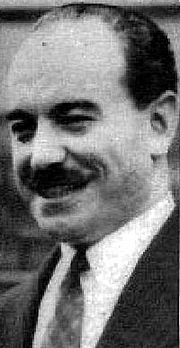Carlos Dávila Espinoza
Carlos Dávila Espinoza (born September 15, 1887 in Los Ángeles , † October 19, 1955 in Washington, DC ) was a Chilean politician , diplomat and journalist . Using dictatorial means, he ruled his country as president for almost 100 days in 1932.
Life
After attending school in Los Ángeles and Concepción , Dávila began studying law at the Universidad de Chile in 1911 ; In the same year he took over the public relations work of the Radical Party, to which he had belonged since his youth. He soon dropped out of his studies and worked in the editorial department of the prestigious daily El Mercurio .
In 1917 he founded his own daily newspaper, La Nación . Under President Carlos Ibáñez del Campo , whom he adored ardently, Dávila was Chilean Ambassador to the United States from 1927 to 1931 . There he completed his law degree and earned a doctorate in law from Columbia University .
Coup and presidency
After the resignation of Carlos Ibáñez del Campo, Juan Esteban Montero Rodríguez succeeded as president. Dávila was one of the driving forces behind the military coup that violently overthrew Montero on June 4, 1932. The victorious junta, of which Dávila belonged, proclaimed the Socialist Republic of Chile, which was only to last for twelve days. Differences quickly arose, especially between Dávila and Defense Minister Marmaduque Grove , so that Dávila resigned from the junta. On June 16, 1932 he came back at the head of the rebellious Ibáñez army garrison from Santiago. Grove and other members of the coup junta were banished to Easter Island , while Carlos Dávila proclaimed himself sole president and formed a new government with moderate democrats and radicals.
Dávila remained in office for a period of just under 100 days, until September 13, whereby his essential contribution to Chilean politics was the proclamation of martial law . Dávila's repressive line quickly led to his liberal comrade, Alberto Cabero, resigning and destabilizing the new junta. Dávila sought order in the economic crisis by giving the state control over production, wages and prices.
This policy of the state-planned economy led to the fact that the liberal forces turned more and more away from Dávila; on September 13th, there was another coup that drove Dávila out of office. The general of the Chilean army, Bartolomeo Blanche Espejo , temporarily took over power until Arturo Alessandri was elected as the new president in free presidential elections on October 30 , and the country was able to get back on track.
International activities after 1933
After this unflattering interlude as President in Chile, Dávila returned to the United States in 1933, where he founded the Editor's Press Service and worked as a correspondent for several South American newspapers.
In 1940 he represented his country internationally at the American Economic Conference , and in 1946 the United Nations appointed him to its Economic and Social Council. His book Nosotros los de América ( We from America ), which appeared in 1949, conjured up the spirit of an economically and defensively united Latin America along the lines of the Schuman Plan for Europe.
When ex-dictator Ibáñez was re-elected president in 1952, his supporter Dávila took over the office of editor of La Nación again until he was appointed general secretary of the Organization of American States in June 1954 . In this capacity he died on October 19, 1955 in Washington.
| personal data | |
|---|---|
| SURNAME | Espinoza, Carlos Dávila |
| BRIEF DESCRIPTION | Chilean politician, diplomat and journalist |
| DATE OF BIRTH | September 15, 1887 |
| PLACE OF BIRTH | Los Angeles |
| DATE OF DEATH | October 19, 1955 |
| Place of death | Washington, DC |
